Photographs: Jay Mandal
Two first time directors --- Arjun Gourisaria and Moinak Biswas --- triumphed over the Bengali language works of veterans Aparna Sen (Iti Mrinalini) and Rituparno Ghosh (Noukadubi) with their Bengali film, Sthaniya Sambaad (Spring In The Colony) at the 11th Annual New York Indian Film Festival.
Other winners were: best director, Aparna Sen, Iti Mrinalini; best actor, Rishi Kapoor, Do Dooni Chaar; best actress, Konkona Sen Sharma, Iti Mrinalini; best screenplay, Mohan Raghavan, T D Dasan Std VI B; best documentary, Max Carlson, Bhopali and best short film, Abhay Kumar, Just That Sort Of A Day.
Built around a dreamy poet and his secret admiration of a young woman who suddenly goes missing in Kolkata, Sthaniya Sambaad explores the tension between older and newer refugees from Bangladesh over space for their tenements.
The oldest Indian film festival in North America, the NYIFF was held May 4-8, and ended with a gala screening of Noukadubi, inspired by a Tagore novel. The screening and the award event at Asia Society was attended by was attended by Salman Rushdie, Mira Nair, Madhur Jaffrey, Rishi Kapoor, Neetu Singh and Aparna Sen.
Journalist and Rediff India Abroad contributor Aseem Chhabra was the festival director. The jury comprised artists, critics and academics including New York University professor Claus Mueller, actress Madhur Jaffrey, scriptwriter Sabrina Dhawan and documentary maker Kavery Kaul.
For many years, the festival, organised by the Indo American Arts Council, used to be known as the Mahindra IAAC Film Festival.
Holy Kitchen vs Bengali Detective
Image: Konkona Sen Sharma won the best actress award for Iti MrinaliniNominated for best picture were Do Dooni Chaar, the story of a beleaguered middle class family in Delhi and their ill-fated aspirations, which had its North American premiere at the festival; Noukadubi, a story of strangers brought together by a boat accident and the concomitant dangerous relationship, and a screen bio of a legendry performer, Sound of Heaven: The Story of Bal Gandharva.
Sen's stirring melodrama about randomness of life, Iti Mrinalini, narrates the tumultuous and soulful events in the life of an actress. While she played the older actress, Konkana played the actress in the early years of her career.
Among the contenders for the best director award were Habib Faisal for Do Dooni Chaar and Ghosh for Noukadubi.
Konkana s competitors included veterans Shabana Azmi (A Decent Arrangement) and Neetu Singh Kapoor (Do Dooni Chaar).
Rishi Kapoor, who plays a New Delhi teacher who becomes obsessed with buying a car, had competition from relative newcomers including Shahnawaz Bhat (Harud).
The Malayalam film, T D Dasan Std VI B, which won the award for best script, is the story of a young boy who writes letters to his father who has left the family and lives in another state. The boy does not realise the person who is replying to his letters is a woman who has no real life ties to him. How long can this secret last? Mohan Raghavan scripted and directed the film.
The competition for best documentary was perhaps more intense than the one for feature film, as each documentary was powerful. While the winner Bhopali took yet another look at the continuing devastation caused by the Bhopal gas leak, Made in India took a penetrating look at the multi-million dollar surrogacy industry in India and the its costs in terms of human lives.
The Bengali Detective told the colourful story of a sleuth in Kolkata while You Don t Belong celebrated universal nature set against (for most part) one single Baul song.
Holy Kitchen, made by celebrated New York chef Vikas Khanna, explored the feeding of thousands of people each day in Hindu temples, pilgrimage centres and ashrams, mostly in India. The first film in the series looked at the institution of langar in Sikh temples.
When Rishi wanted a drink
Image: Rishi and neetu Kapoor, Habib Faisal and Aseem Chhabra discuss Do Dooni CharPhotographs: Jay Mandal
But it was the Kapoor couple, Rishi and Neetu, who garnered much attention at the festival.
Yet Neetu, who received laurels for her luminous performance as the beleaguered wife and mother in Do Dooni Chaar, is not looking at the success to relaunch her career.
"I am not ready for a career," she confessed last Wednesday, after the screening of the film inaugurated the 11th edition of the New York Indian Film Festival.
Neetu, who appeared in a lead role after nearly 30 years of playing substantial roles (bar a cameo in Love Aaj Kal), also said if she came across a script like Do Dooni Chaar again, she might accept the project.
Her husband and co-star, Rishi Kapoor, and director and story writer Habib Faisal were present. The discussion, moderated by Aseem Chhabra, lasted for about 15 minutes, with Rishi getting itchy for a drink towards the end. It is time to say cheers, he said laughing heartily.
Neetu said when Faisal contacted her husband about offering her the role of Kusum Duggal, Rishi thoroughly discouraged him and even suggested a few alternatives.
Out of curiosity, Neetu let him narrate the plot -- about a middle class family with unrealistic aspirations. She fell for it in no time.
Asked if she was offered another script like Do Dooni Chaar, would she act with her husband again, she answered with an enthusiastic YES.
She also said she would also love to be in a film with her son, Ranbir Kapoor.
Rishi, who plays a struggling school teacher pushed by a desire for false prestige into buying a car, confessed the script came to him unexpectedly.
And Neetu was nervous...
Image: Rishi and Neetu in Do Dooni CharAfter he finished hearing the story, Rishi, who is in his early 50s, asked Faisal who would play the role of the school teacher. He knew his days of chasing young women down the valleys were over a long ago, yet he was shocked when he was told the role of the roly-poly teacher was meant for him. Rishi had thought some young actor would play the role and Faisal would make the actor look older. "Indian films are youth oriented," he reasoned.
Rishi said he took up the part because he had not played a middle class man in a good film. For most part, he played the glamorous rich kid.
Was Neetu nervous the first day she faced the camera for Do Dooni Chaar?
She said she was, just for a few hours.
Rishi took the mike from her to reveal the real story. She was fumbling with her lines and he was worried she had forgotten them. But he soon discovered she had forgotten her contact lenses and did not want to use glasses.
He is right, she said with a chuckle.
Some people think Habib Faisal, who has done commendable job writing and directing Do Dooni Chaar, is a rank newcomer. But his bio reveals he has been around for about 10 years, writing or co-writing films such as the successful Salaam Namaste! and disappointing films like Jhoom Barbar Jhoom and Ta Ra Ra Pum. He also wrote the script and dialogue for the modest hit, Band Baaja Baaraat, which released last year.
Faisal said many people told him they found Do Dooni Char 'cute.' As the film ends, the family has some happy news and, in the background, there is a big celebration as India has won a huge cricket match. But when you consider what the middle class family has gone through in the film, Faisal mused, you may want to think of it as a tragedy.
Some of the incidents in the film, where former students who have made it big in life gushingly thank their maths teacher (Rishi Kapoor), reminded him of his own teacher-father in New Delhi, Faisal confessed.
Film-makers have become lazy: Faisal
Image: Habib Faisal with Neetu and Rishi KapoorPhotographs: Jay Mandal
Faisal also said that, in recent years, film-makers who are seeking to make films that are a departure from the formula films have learned to keep the costs low because, unlike in the 1970s and 1980s, there is no loan from National Film Development Corporation.
Many good films including M S Sathyu's little seen Bara came from these loans.
Faisal acknowledged good films were made then, though he did not name them. But there were also film-makers who became "lazy" because loans were not difficult to obtain.
He also revealed he had taken a risk by making a film about an older couple, though their teenage children have substantial roles. But the actors who play the teenagers are not known artists and cannot propel the box-office.
While casting Rishi Kapoor and Neetu Singh as the middle class couple, he hoped the audiences aged 35 and above would be swept by nostalgia.
For the record, Do Dooni Chaar which received generally glowing reviews, had a short run at the box-office but because the film, which has not had a theatrical release in the lucrative North American market, did not cost much, it recovered the investment, thanks also to ancillary rights such as sale to television.
Where was the glamour?
Image: IAAC's ebullient head, Aroon ShivdasaniPhotographs: Jay Mandal
The festival kicked off with the screening of Do Dooni Chaar at the Paris, one of the best known venues for art films from across the world. This is the same theatre that hosted the premiere of many Ismail Merchant films including A Room With A View.
The event was attended by actors Ajay Naidu and Samrat Chakraborty and veteran actress and food book writer Madhur Jaffrey.
Actress-director Aparna Sen, whose Iti Mrinalini was the centrepiece of the festival, was also present.
Though the festival featured films starring many well known artistes including Aamir Khan (the vintage Raakh), Irrfan Khan (Yeh Saali Zindagi), Jaya Bhaduri (Meherjaan) and Shabana Azmi (A Decent Arrangement), they did not attend the premiere. Perhaps the fact that she recently spent over two weeks in America attending, among other things the India festival at Kennedy Center in DC, deterred Shabana from coming back so soon.
The inaugural event would have benefitted by the glamour sisters Raima and Riya Sen (Noukadubi) carry.
Getting air tickets for many artists and film-makers have become forbiddingly difficult. Like many other non-profit organisations reeling under the slow economy, IAAC is also having a very difficult time. IAAC's ebullient head, Aroon Shivdasani, acknowledged that the organisation hopes to do better with the artistes and directors next year but did not elaborate.


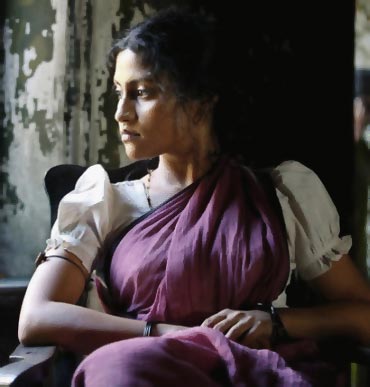
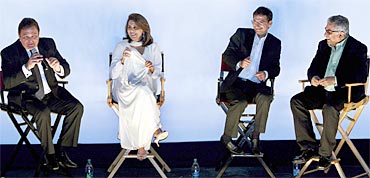
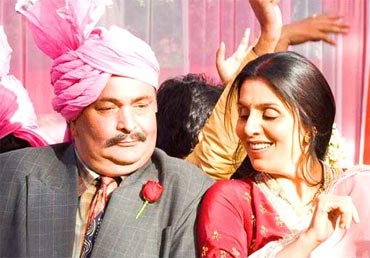
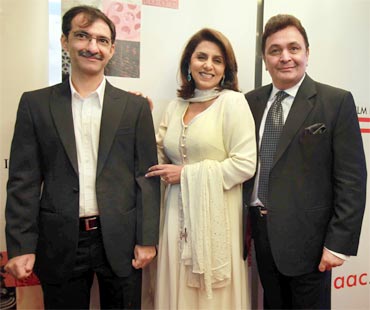
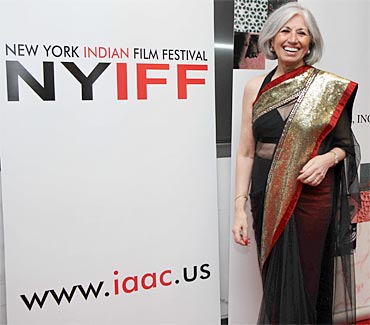
Comment
article